As devoted dog parents, we all want to ensure our beloved companions receive the best nutrition possible. For many, that means exploring homemade meal options that are healthy, free from fillers, and tailored to their specific needs. This guide delves into creating Homemade Dog Food Recipes Vet Approved Turkey and rice dishes, perfect for pups with sensitive stomachs or those who simply deserve a wholesome, delicious diet.
Our furry family members, like my own 10-year-old dog, Tanah, are integral to our lives, accompanying us through thick and thin. As dogs age, their dietary requirements often shift, making a simple, digestible, and nutrient-rich diet crucial. This homemade turkey and rice dog food with veggies recipe was inspired by the need for a nutritious, budget-friendly meal that provides peace of mind, knowing exactly what goes into their bowl. If you’re seeking a healthy and delicious meal option, this vet-approved approach to homemade dog food is one you’ll want to keep in your rotation, especially if you have a picky eater. For more insights on feeding selective pups, explore our article on best dog food for picky dogs.
What is Homemade Turkey and Rice Dog Food with Veggies?
This recipe offers a balanced, homemade meal featuring lean ground turkey, perfectly cooked brown rice, and a medley of fresh vegetables such as zucchini, carrots, and spinach. It’s lightly cooked, easy for digestion, and highly adaptable to meet your dog’s specific dietary needs. This combination creates a complete meal that supports overall health.
While homemade meals should always be discussed with your veterinarian, these ingredients are frequently recommended for dogs with sensitive stomachs, mild food intolerances, or during recovery from illness. The synergistic blend of high-quality protein, essential fiber, and vital vitamins makes it an excellent occasional meal or, with proper veterinary guidance, a long-term dietary staple. Providing a balanced diet is key, and recipes like this ensure your dog receives the necessary nutrients without unnecessary additives.
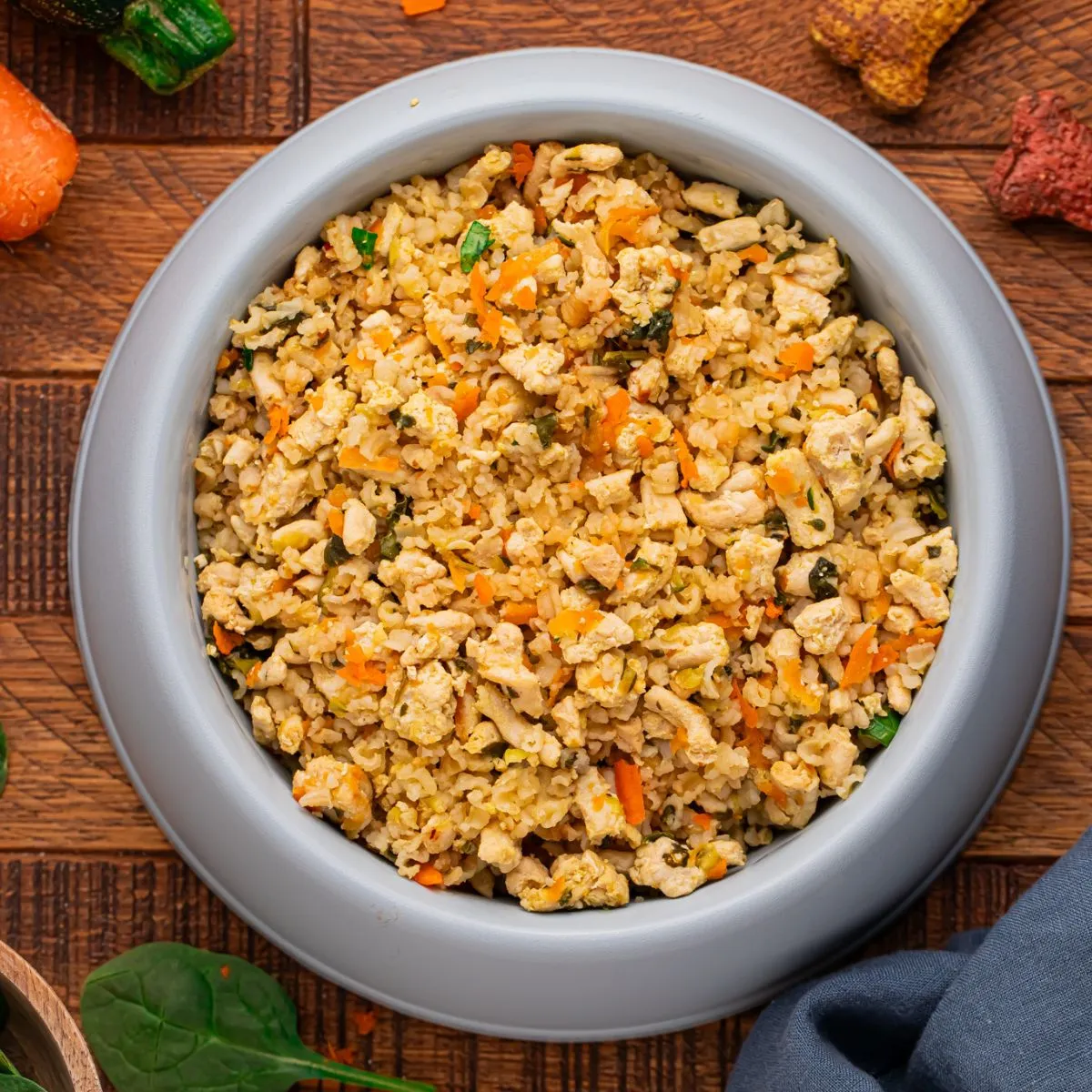 Freshly prepared homemade turkey and rice dog food with vegetables in a bowl, ready for a happy pup.
Freshly prepared homemade turkey and rice dog food with vegetables in a bowl, ready for a happy pup.
When to Serve This Vet-Approved Recipe
This versatile homemade dog food can be incorporated into your dog’s diet in various ways, offering benefits across different scenarios:
- As an Everyday Meal: With prior veterinary consultation, this recipe can be a daily part of a balanced diet, ensuring your dog gets fresh, wholesome ingredients consistently.
- For Sensitive Stomachs: The lean turkey and easily digestible brown rice are gentle on the digestive system, making it ideal for dogs prone to gastrointestinal upset.
- During Recovery: Following an illness or surgery, many veterinarians suggest bland, home-cooked meals to aid in recovery and minimize digestive stress.
- As a Topper: Mix a spoonful or two with your dog’s regular kibble to enhance its nutritional value and appeal, enticing even the most reluctant eaters.
- For Picky Eaters: The fresh, appealing ingredients can often tempt even the most stubborn dogs to finish their meals, turning mealtime into a much-anticipated event.
Why Your Dog (and You) Will Adore This Recipe
There are numerous compelling reasons why this homemade turkey dog food recipe becomes a staple in many households:
- Simple, Wholesome Ingredients: All components are readily available at any local grocery store, making preparation straightforward and accessible. You control the quality of every single ingredient.
- Customizable: Easily adjust the recipe based on your dog’s preferences, allergies, or specific health requirements, making it truly personalized. This flexibility is a huge advantage over commercial foods.
- Cost-Effective: Preparing meals at home can be significantly more economical than purchasing many premium commercial dog foods, offering great value without compromising quality.
- Peace of Mind: Knowing precisely what’s in your dog’s meal – no hidden fillers, artificial flavors, or questionable preservatives – provides immense comfort and confidence.
- Loved by Dogs: From energetic puppies to distinguished seniors like Tanah, dogs of all ages tend to adore the fresh taste and appealing texture of this homemade food.
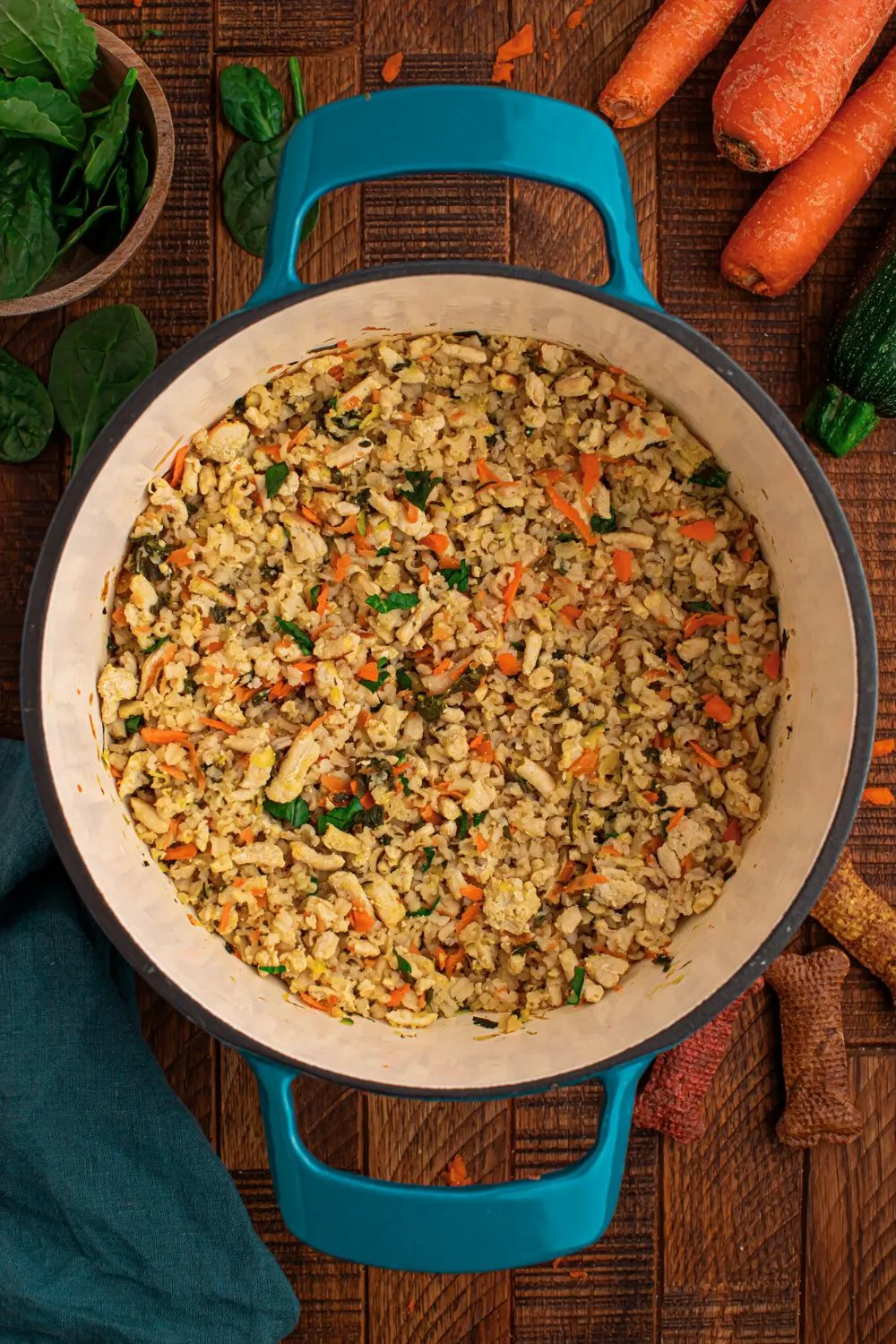 Raw ingredients for homemade dog food, including ground turkey, rice, and fresh vegetables, combined in a large pot.
Raw ingredients for homemade dog food, including ground turkey, rice, and fresh vegetables, combined in a large pot.
Essential Ingredient Breakdown for a Healthy Dog Food
Understanding each component in this vet approved homemade dog food recipe helps ensure you’re providing the best for your canine companion:
- Ground Turkey: This lean protein source is low in fat and incredibly easy for dogs to digest. Always opt for 93% lean or leaner ground turkey. Crucially, avoid any pre-seasoned turkey, as spices, garlic, or onions can be toxic to dogs.
- Brown Rice: A fantastic source of healthy carbohydrates and essential fiber. Brown rice offers more nutrients than white rice, but for dogs with extremely sensitive stomachs, white rice can be a milder alternative.
- Zucchini: A low-calorie vegetable rich in vitamin C and potassium. To ensure easy digestion, always shred or finely chop zucchini before adding it to the recipe.
- Carrots: Packed with beta-carotene (a precursor to vitamin A) and fiber. Finely shred or dice carrots to help with nutrient absorption and ease of eating.
- Spinach: Provides iron, vitamin A, and antioxidants. Use spinach in moderation and always chop it finely to aid in digestion.
- Water or Low-Sodium Broth (Optional): Adding a bit of water or low-sodium, dog-safe broth can help keep the food moist and make it even more enticing for dogs who prefer softer textures or need extra hydration.
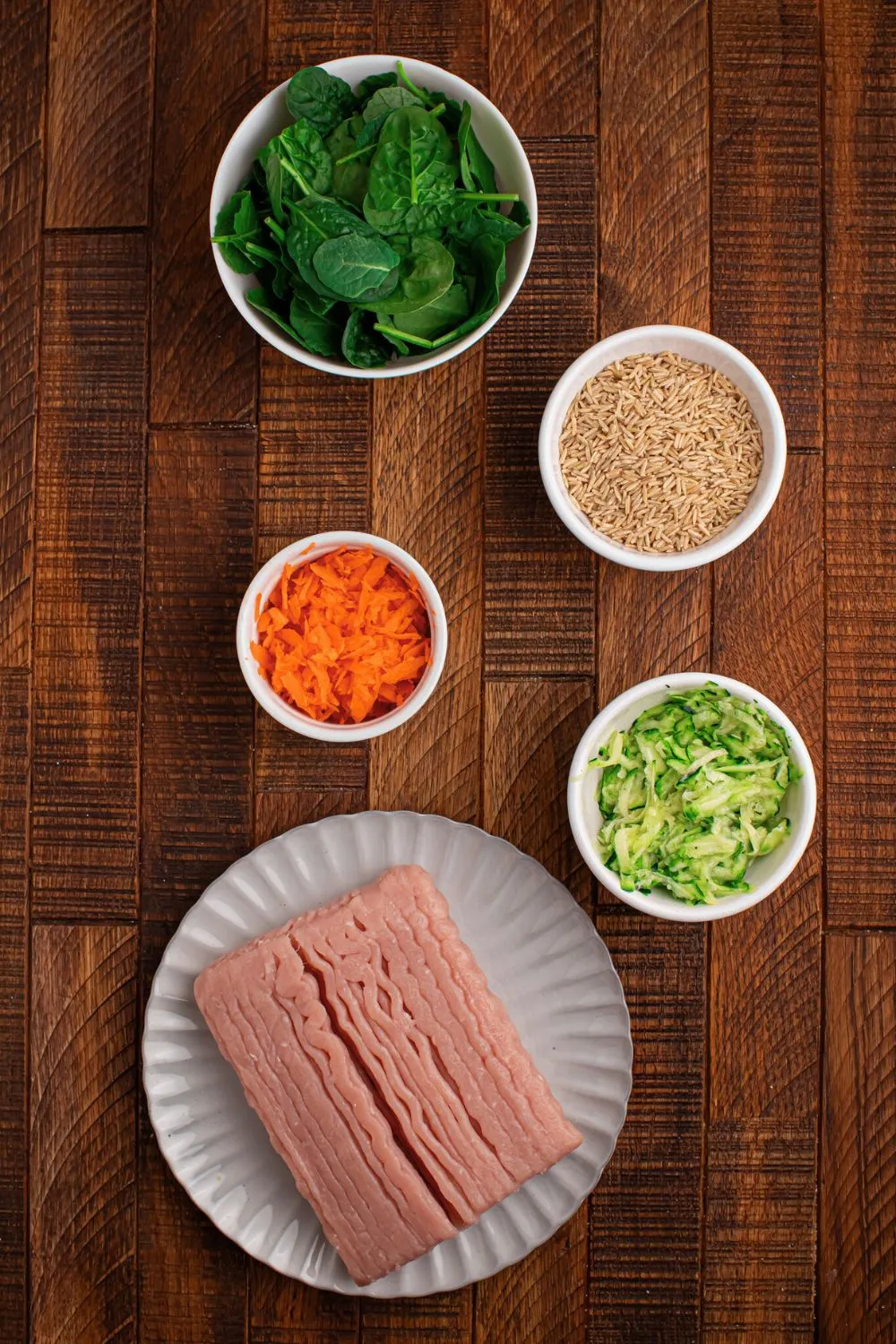 Separate containers holding fresh ingredients like lean ground turkey, brown rice, zucchini, carrots, and spinach for a healthy dog meal.
Separate containers holding fresh ingredients like lean ground turkey, brown rice, zucchini, carrots, and spinach for a healthy dog meal.
Variations to Customize Your Dog’s Meal
One of the great advantages of homemade dog food recipes vet approved turkey is the flexibility to adapt them. Here are some healthy variations:
- Protein Swap: If your dog has a preference or allergy, you can easily substitute ground turkey with other lean proteins like ground chicken, lean beef, ground lamb, or even cooked and deboned white fish.
- Grain-Free Option: For dogs with grain sensitivities, replace brown rice with cooked quinoa, sweet potatoes, or butternut squash to maintain a good carbohydrate source.
- Extra Veggies: Boost the nutrient content by adding small amounts of other dog-safe vegetables such as peas, green beans, or plain pumpkin puree.
- For More Calories: If your dog needs to gain weight or has high energy requirements, mix in a small amount of plain canned salmon or a teaspoon of olive oil, but always consult your vet first.
Troubleshooting Common Homemade Dog Food Issues
Even with the best intentions, you might encounter minor challenges. Here’s how to address them:
- Dog won’t eat it? Gently warm the food to release its aroma, or stir in a splash of low-sodium chicken broth to make it more appealing.
- Too dry? Add extra cooked rice or a little water when reheating to achieve a softer consistency.
- Dog needs softer food? For senior dogs or those with dental issues, pureeing the cooked vegetables before mixing can create a smoother texture.
- Dog has allergies? Simply swap out any ingredient that triggers a reaction and replace it with a safe alternative from the variations list, always introducing new foods gradually.
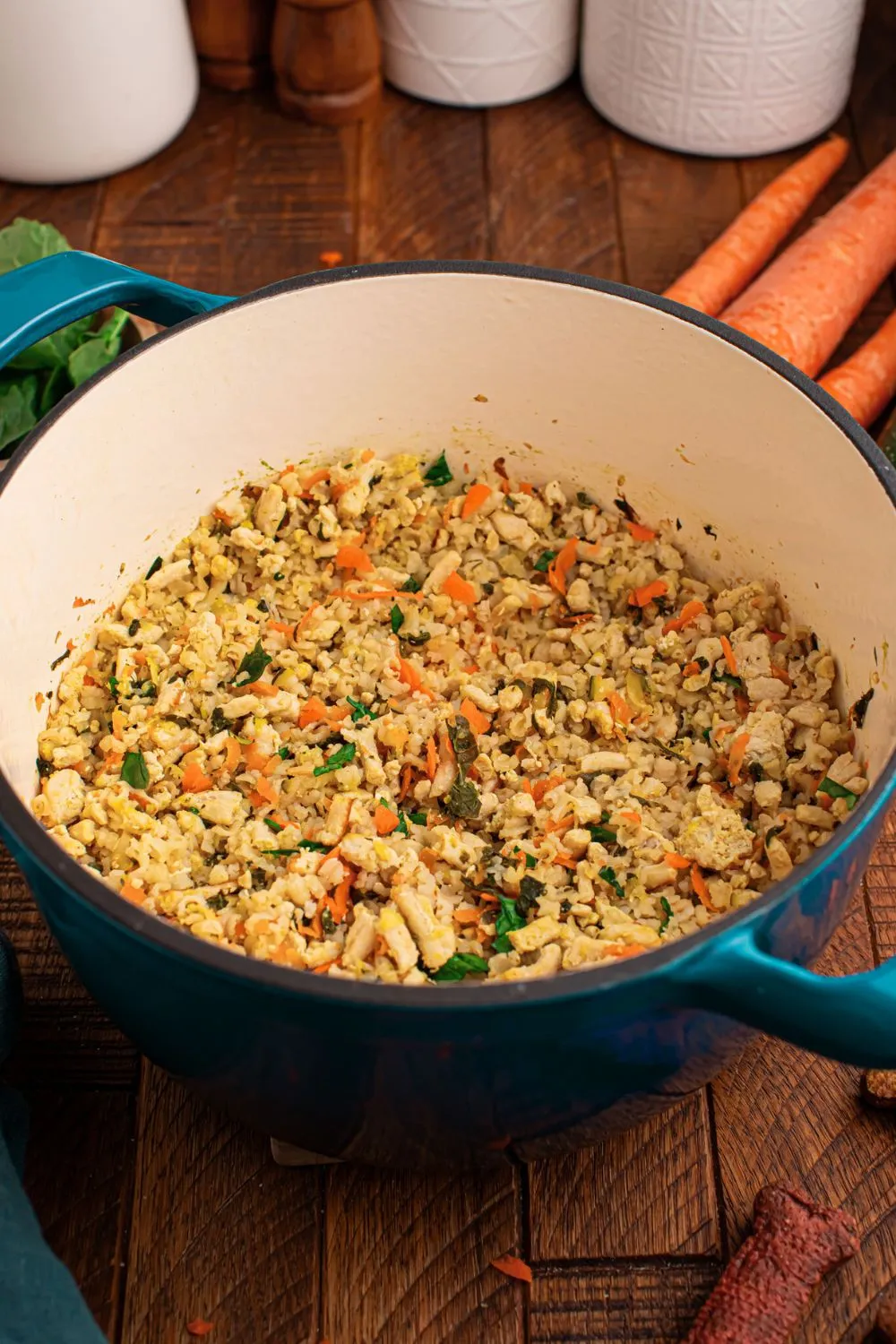 Cooked homemade turkey and rice dog food with mixed vegetables, simmering in a pot, emitting a delicious aroma.
Cooked homemade turkey and rice dog food with mixed vegetables, simmering in a pot, emitting a delicious aroma.
Storage and Serving Tips for Homemade Dog Food
Proper storage ensures the freshness and safety of your homemade dog food, while correct serving prevents issues:
- Refrigerator: Store the cooked food in an airtight container for up to 5 days. This is ideal for short-term meal planning.
- Freezer: For longer storage, portion the food into freezer-safe containers or bags. It can be kept frozen for up to 2 months, making meal prep a breeze.
- Serving Temperature: Always serve the food slightly warm or at room temperature. Never serve hot food, as it can burn your dog’s mouth.
- Portion Size: This varies significantly based on your dog’s weight, age, and activity level. It is crucial to consult your veterinarian to determine the precise amounts tailored to your dog’s individual needs.
Make-Ahead and Freezing for Convenience
Many dog owners, including myself, find it incredibly convenient to prepare a larger batch of this homemade turkey and rice dog food and freeze portions. This ensures a healthy, ready-to-serve meal is always on hand without daily cooking.
After cooking, allow the food to cool completely. Then, divide it into individual portions using freezer-safe containers or bags. Label each container with the date and your dog’s name. To serve, simply thaw a portion overnight in the refrigerator and warm it slightly before offering it to your dog. This method saves time and ensures consistent nutrition.
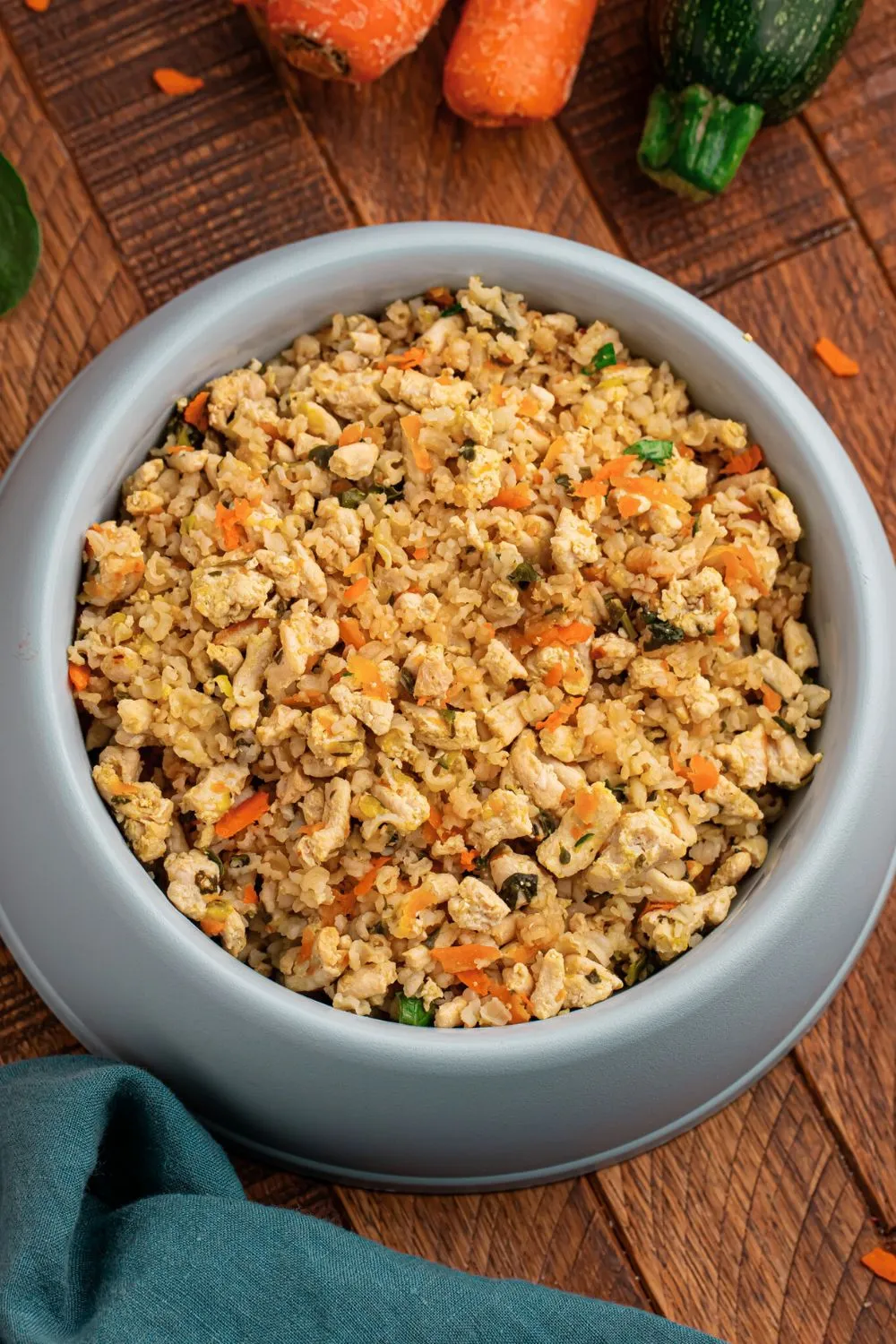 Portioned homemade turkey and rice dog food in a storage container, with fresh carrots and zucchini on the side, emphasizing vet-approved nutrition.
Portioned homemade turkey and rice dog food in a storage container, with fresh carrots and zucchini on the side, emphasizing vet-approved nutrition.
Lightened-Up Version for Calorie Management
For dogs who are on a calorie-restricted diet or need to lose a few pounds, this homemade dog food recipe vet approved turkey can be easily adapted:
- Use Extra-Lean Turkey: Opt for 99% lean ground turkey to significantly reduce fat content.
- Low-Starch Veggies: Prioritize low-starch vegetables like zucchini and spinach.
- Reduce Rice, Add Fiber: Decrease the brown rice quantity by one-third and replace it with steamed green beans. Green beans add bulk and fiber without adding significant calories.
Budget Breakdown: Affordable Homemade Meals
Creating homemade dog food is not only healthier but often more budget-friendly than premium commercial options. Here’s a typical cost breakdown:
- 1 lb lean ground turkey – ~$4.50
- 1 cup uncooked brown rice – ~$0.60
- ½ cup shredded zucchini – ~$0.50
- ½ cup shredded carrot – ~$0.40
- 1 cup chopped spinach – ~$0.80
Total estimated cost: ~$6.80 for approximately 8 cups of food.
This translates to less than $0.90 per cup, making it considerably more affordable than many high-quality store-bought dog foods while offering superior control over ingredients.
Beginner Mistakes to Avoid When Making Dog Food
To ensure your homemade dog food is safe and beneficial, steer clear of these common errors:
- Using seasoned meat: Spices, garlic, onions, and other common human food seasonings can be highly toxic to dogs. Always use plain, unseasoned ingredients.
- Serving too hot: Always allow the food to cool to a safe, warm, or room temperature before feeding to prevent burns.
- Skipping veggie prep: Large chunks of vegetables can be difficult for dogs to digest and may pose a choking hazard. Always shred or finely chop vegetables.
- Not checking with your vet: While this recipe is designed with healthy ingredients, it’s crucial to consult your veterinarian to ensure any homemade meal plan meets your dog’s complete nutritional needs, especially if feeding long-term.
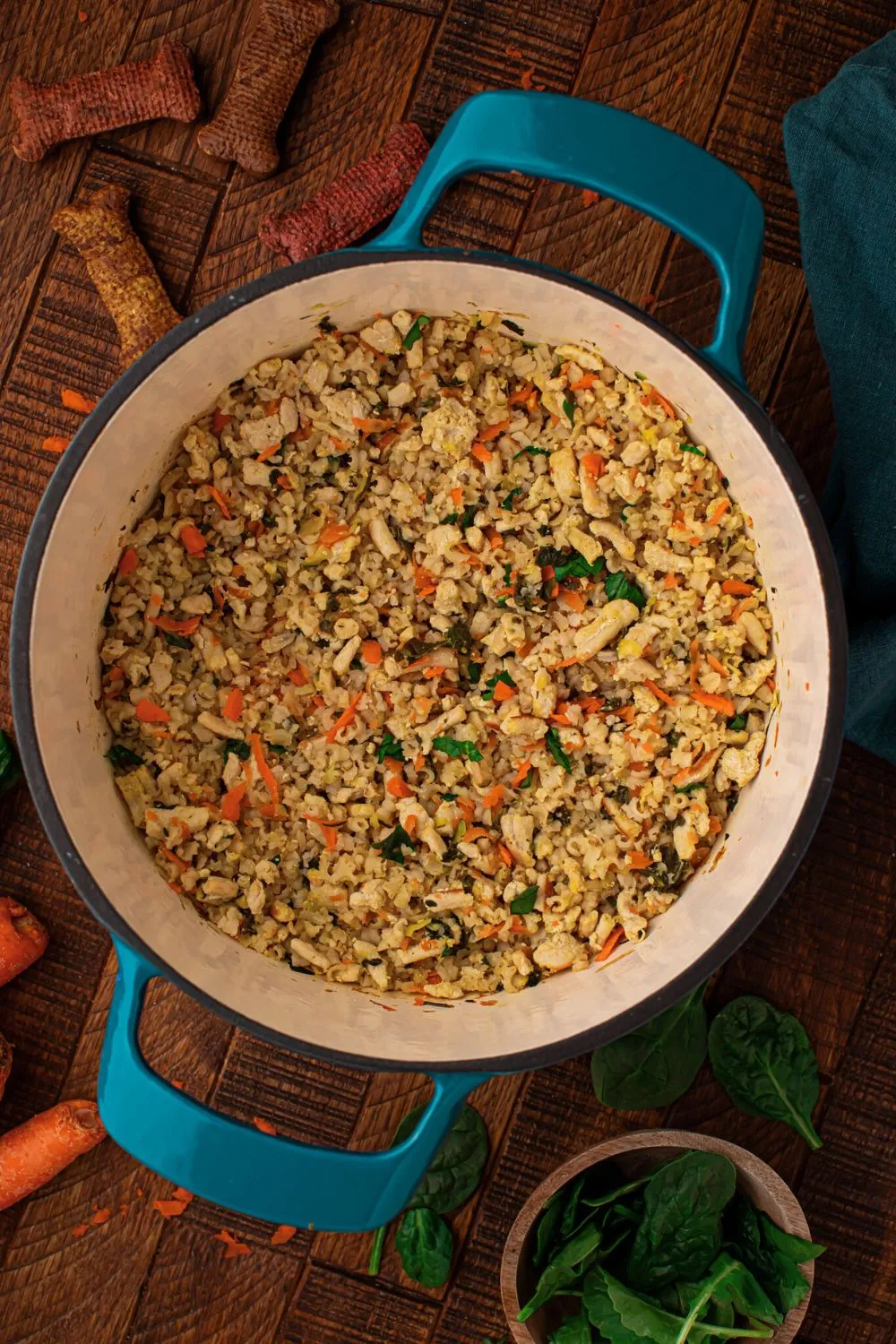 An overhead view of freshly made homemade turkey and rice dog food, surrounded by dog treats and cooking ingredients on a wooden table.
An overhead view of freshly made homemade turkey and rice dog food, surrounded by dog treats and cooking ingredients on a wooden table.
Why This Recipe Stands Apart from Other Homemade Options
While there are many homemade dog food recipes available, this turkey and rice version distinguishes itself for several key reasons:
- Balanced Simplicity: Unlike recipes that might overload on protein or carbs, this one maintains a balanced ratio, making it gentle on digestion while still being highly satisfying and complete.
- Senior-Dog Friendly: The lean ground turkey, soft-cooked rice, and finely shredded vegetables are particularly easy for older dogs, like my 10-year-old Tanah, to chew and digest, supporting their unique needs.
- Fresh Vegetables Only: The recipe emphasizes fresh produce, avoiding frozen blends that might contain hidden seasonings or excessive sodium, ensuring pure, unadulterated nutrition.
- Budget-Friendly: At under $1 per cup, it provides a highly nutritious and wholesome meal option that is more economical than most premium store-bought alternatives.
- Flexible for Sensitivities: It can be easily adapted for grain-free diets, allergy-friendly requirements, or higher calorie needs with minimal adjustments, offering true customization for every dog.
Meal Prep & Portioning Guide for Different Dog Sizes
Determining the correct portion size is vital and depends on your dog’s age, weight, and activity level. Always consult your vet for precise guidance, but here’s a general starting point:
- Small dogs (10–20 lbs): ½ to 1 cup per day, divided into two meals.
- Medium dogs (20–50 lbs): 1½ to 3 cups per day, divided into two meals.
- Large dogs (50–80 lbs): 3 to 4½ cups per day, divided into two meals.
- Extra-large dogs (80+ lbs): 4½ to 6 cups per day, divided into two meals.
Meal Prep Tips:
- Make a double batch and freeze it in daily portions for convenient thawing and serving.
- Label containers clearly with your dog’s name and portion size to avoid any mix-ups.
- If you’re feeding multiple dogs, portion their meals ahead of time to prevent overfeeding and ensure each dog receives their appropriate amount.
Protein Swaps & Dietary Adjustments for Your Pup
This recipe is a versatile base that can be modified to suit various health needs or preferences:
- Protein Swaps: In addition to ground turkey, you can use ground chicken, lean beef, ground lamb, or cooked white fish (ensure it’s deboned).
- Grain-Free Option: For a grain-free diet, replace the rice with cooked quinoa, sweet potato, or butternut squash.
- Lower-Fat Version: Opt for 99% lean ground turkey or ground chicken breast to further reduce fat content.
- Higher-Fat Version: If your dog needs more calories, you can add a teaspoon of olive oil or coconut oil per serving, but only if approved by your vet.
- Vegetable Swaps: Green beans, peas, or pumpkin can be used to replace or supplement the zucchini and spinach.
- Sensitive Stomach Adjustment: For very sensitive dogs, using white rice instead of brown and sticking to a single, mild vegetable like carrots can be beneficial.
Always introduce changes gradually to avoid upsetting your dog’s digestion, and critically, check with your vet before making significant dietary adjustments. They can provide personalized advice based on your dog’s health profile.
Frequently Asked Questions (FAQ)
Can I use white rice instead of brown rice?
Yes. White rice is generally easier to digest and may be a better option for dogs with very sensitive stomachs or those recovering from digestive upset.
Can I add supplements to this recipe?
Yes, but it’s crucial to consult your veterinarian first. For long-term feeding of homemade diets, your vet may recommend specific calcium or omega-3 supplements to ensure complete nutritional balance.
How much should I feed my dog?
Portion size is highly individual, depending on your dog’s size, age, activity level, and overall health. Your veterinarian is the best resource for providing tailored guidance for your dog’s specific needs.
Can I use frozen vegetables?
Yes, frozen vegetables can be used as a convenient alternative. Just ensure they are plain and do not contain any added salt, seasonings, or sauces, which can be harmful to dogs.
How long can I store it in the freezer?
When stored in airtight, freezer-safe containers, this homemade dog food can be kept in the freezer for up to 2 months, making it excellent for batch cooking.
Final Thoughts
Crafting homemade dog food recipes vet approved turkey and rice dishes is a wholesome, straightforward way to provide your dog with a meal they’ll truly relish. It’s a fresh, budget-conscious, and highly adaptable option suitable for dogs with diverse dietary requirements.
For me, preparing Tanah’s food is a meaningful gesture, a way to reciprocate the boundless love and unwavering loyalty she has shown me throughout the years. Whether your aim is to optimize your dog’s well-being or simply to have absolute clarity on what they consume, this recipe serves as an excellent starting point. It offers a tangible way to enhance their health and happiness through carefully chosen, nourishing ingredients.
